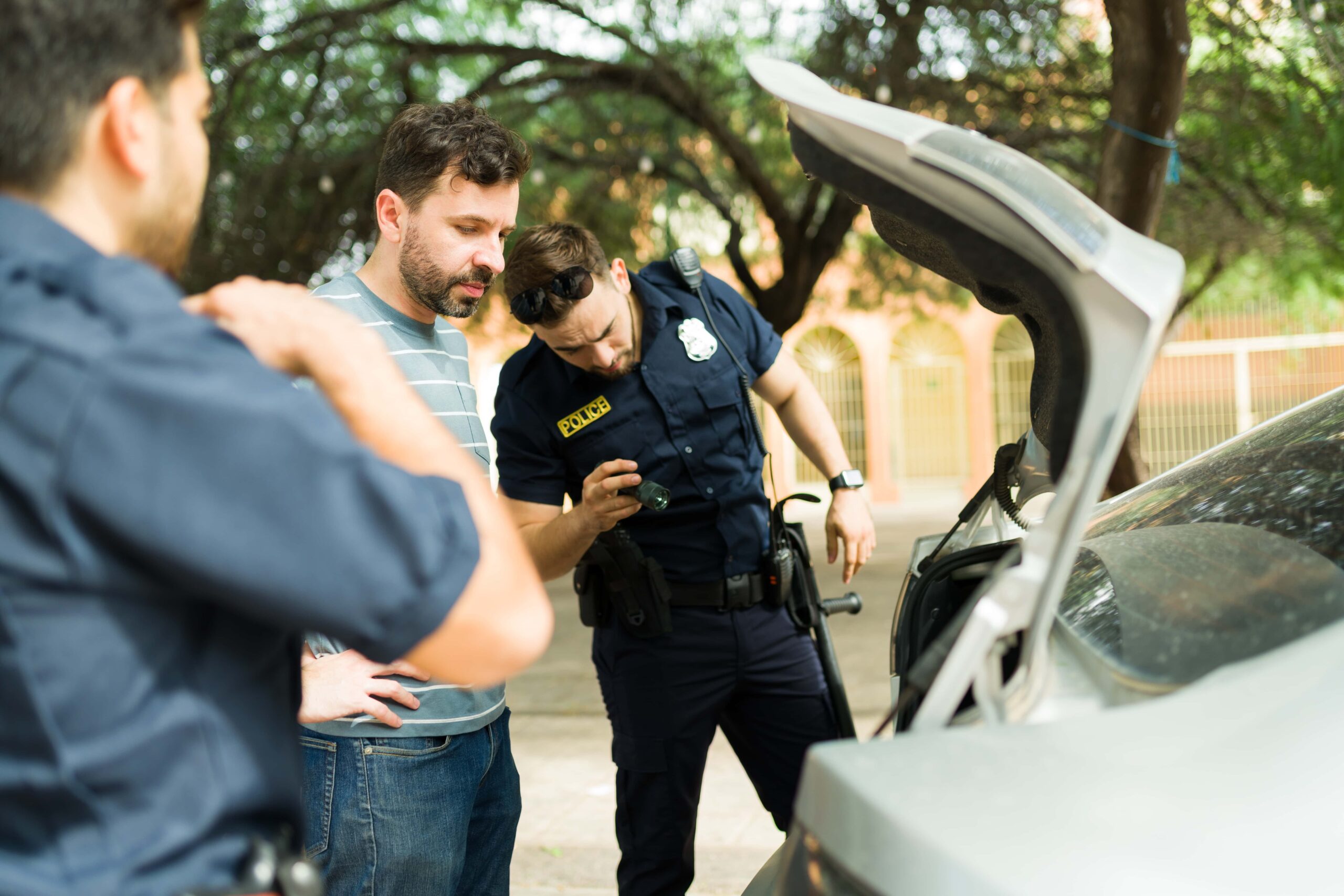Miami’s vibrant energy, sun-drenched beaches, and bustling nightlife make it a truly unique place to live and visit. But alongside the excitement comes the reality of its busy roads and, inevitably, the potential for a traffic stop.
While most traffic stops are routine, they can quickly escalate, especially when an officer asks to search your vehicle. This can be a confusing and intimidating situation. At Rossen Law Firm, we understand the anxieties that come with any encounter with law enforcement. We believe that an informed public is an empowered public.
The Fourth Amendment: Your Shield Against Unreasonable Searches
At the heart of your protection against unwarranted police intrusions is the Fourth Amendment to the U.S. Constitution. It states:
"The right of the people to be secure in their persons, houses, papers, and effects, against unreasonable searches and seizures, shall not be violated, and no Warrants shall issue, but upon probable cause, supported by Oath or affirmation, and particularly describing the place to be searched, and the persons or things to be seized."
In essence, the Fourth Amendment safeguards your privacy and freedom from arbitrary governmental intrusion. This protection extends to your vehicle, but with significant nuances that differentiate it from, say, your home.
The U.S. Supreme Court has long recognized a "lower expectation of privacy" in vehicles compared to homes, primarily due to their mobile nature and their operation on public roads. This diminished expectation forms the basis for various exceptions to the warrant requirement when it comes to vehicle searches.
The "Automobile Exception"
The most prominent exception allowing for warrantless vehicle searches is the "automobile exception." Established in the landmark case of Carroll v. United States (1925), this exception permits police to search a vehicle without a warrant if they have probable cause to believe it contains evidence of a crime.
Probable cause exists when there are facts and circumstances within the officer's knowledge, based on reasonably trustworthy information, that would lead a person of reasonable caution to believe that a crime has been, is being, or is about to be committed, and that evidence of that crime will be found in the place to be searched.

In the context of a traffic stop, probable cause might arise from various observations, such as:
- Plain View: If an officer sees contraband (like drugs, weapons, or drug paraphernalia) in plain sight within your vehicle.
- Odor of Contraband: The distinct smell of marijuana or other illicit substances emanating from your car.
- Statements Made: If you or a passenger make statements that incriminate you or suggest the presence of illegal items.
- Behavior Indicating Criminal Activity: Furtive movements, attempts to conceal something, or unusually nervous behavior, especially when combined with other suspicious circumstances.
- Reliable Information: A credible tip from an informant that your vehicle contains evidence of a crime.
If probable cause exists, the police do not need to demonstrate "exigent circumstances" (an immediate need to act to prevent the destruction of evidence or harm) to search your vehicle under the automobile exception. The mobility of the vehicle itself is considered the exigent circumstance.
Other Justifications for Warrantless Vehicle Searches in Florida
While probable cause is the most common justification, several other scenarios can permit police to search your car without a warrant in Florida:
1. Consent to Search
The simplest and most direct way police can search your car without a warrant is if you voluntarily consent to the search. If an officer asks for permission to search your vehicle, you have an absolute right to refuse. You are not legally obligated to give consent.
Important considerations regarding consent:
- Voluntary and Unequivocal: Your consent must be given freely and without coercion, threats, or misrepresentation. Police cannot trick or intimidate you into giving consent.
- Clear Refusal: If you choose to refuse, state it clearly and politely: "Officer, I do not consent to a search of my vehicle."
- No Adverse Inference: Your refusal to consent cannot be used as probable cause for a search. An officer cannot say, "You refused a search, so now I have probable cause."
- Scope of Consent: If you do consent, you can limit the scope of the search (e.g., "You can search the passenger compartment, but not the trunk"). However, it's generally advisable to avoid giving any consent at all.
- Withdrawal of Consent: You can withdraw your consent at any time during the search, though any evidence found before you withdraw consent may still be admissible.
Police often ask for consent because it simplifies their job and eliminates the need to establish probable cause. Knowing your right to refuse is paramount to protecting your Fourth Amendment rights.
2. Search Incident to Lawful Arrest
If you are lawfully arrested during a traffic stop, police may be permitted to search your vehicle incident to that arrest. This exception allows officers to search the area within your immediate control, typically the passenger compartment, to ensure their safety (by checking for weapons) and to prevent the destruction of evidence.
The scope of a search incident to arrest is generally limited to the area where you could reasonably reach at the time of your arrest. However, legal interpretations of this can be complex, and the Supreme Court's rulings on this have evolved.
For example, in Arizona v. Gant (2009), the Court limited vehicle searches incident to arrest to situations where the arrestee is unsecured and within reaching distance of the passenger compartment at the time of the search, or when there is probable cause to believe that the vehicle contains evidence of the offense of arrest.
3. Inventory Search
When a vehicle is lawfully impounded by law enforcement (for reasons such as a DUI arrest, parking violations, or if it's abandoned), police are permitted to conduct an "inventory search" of the vehicle. This is not intended as an investigative search for evidence of a crime, but rather as a routine administrative procedure to:
- Protect the owner's property while the vehicle is in police custody.
- Protect the police from claims of lost or stolen property.
- Protect police from potential danger (e.g., hidden explosives).
For an inventory search to be legal, it must be conducted according to standardized police department policies and procedures, not as a pretext for an investigatory search. If an officer deviates from these standard procedures, the search may be deemed unlawful.
4. Terry Frisk of the Vehicle (Limited)
Building on Terry v. Ohio (1968), which allows for a pat-down of a person for weapons based on reasonable suspicion, police can conduct a very limited search of a vehicle for weapons if they have reasonable suspicion that a driver or occupant is dangerous and may gain immediate control of a weapon. This is often referred to as a "Terry frisk" of the vehicle.
This is a narrow exception and does not allow for a full search of the vehicle. It's strictly limited to areas where a weapon could be concealed and readily accessed.
5. Exigent Circumstances
While the automobile exception itself often addresses the exigent circumstance of a moving vehicle, other truly urgent situations might justify a warrantless search. This could include:
- Hot Pursuit: If police are in hot pursuit of a fleeing suspect and the suspect enters a vehicle.
- Imminent Destruction of Evidence: If there's an immediate threat that evidence inside the vehicle will be destroyed before a warrant can be obtained.
- Danger to Public Safety: If the vehicle poses an immediate threat to public safety (e.g., a bomb is believed to be inside).
These circumstances require a very high bar to meet and are narrowly construed by the courts.
What to Do if You're Stopped by Police in Miami

Knowing your rights is one thing; exercising them effectively during a stressful traffic stop is another. Here's what we advise:
- Stay Calm and Pullover Safely: As soon as you realize an officer is signaling you to stop, pull over to the right side of the road in a safe location.
- Keep Your Hands Visible: Place your hands on the steering wheel where the officer can see them. Avoid sudden movements.
- Provide Documents: When requested, provide your driver's license, vehicle registration, and proof of insurance. Florida law requires you to carry these documents.
- You Have the Right to Remain Silent: You are not required to answer questions about where you're going, where you've been, or what you've been doing. You can politely state, "Officer, I prefer not to answer any questions."
- Do NOT Consent to a Search: If an officer asks to search your car, politely but firmly state, "Officer, I do not consent to a search of my vehicle." Remember, you have this right.
- Do NOT Resist: If the officer proceeds to search your vehicle despite your refusal, do not physically resist. State clearly, "I do not consent to this search," but do not escalate the situation. Your attorney can challenge the legality of the search later in court.
- Note Details: Try to remember as many details as possible: the officer's badge number, the time of day, what was said, and what happened. This information will be crucial if you need to challenge the search.
- Record (if safe and legal): In Florida, you generally have the right to record police officers in public, as long as it doesn't interfere with their duties. However, be cautious and ensure your actions are not interpreted as obstructive.
- Contact an Attorney Immediately: If your car is searched and anything is found, or if you are arrested, contact an experienced criminal defense attorney at Rossen Law Firm as soon as possible.
Challenging an Unlawful Search in Florida
If you believe police searched your car illegally during a Miami traffic stop, it is absolutely essential to challenge that search in court. Evidence obtained through an unlawful search may be subject to the exclusionary rule, meaning it cannot be used against you in court. This can be a powerful tool in your defense, potentially leading to the dismissal or reduction of charges.
An experienced criminal defense attorney will meticulously review the details of your traffic stop and search, including:
Adherence to procedure: Did the officers follow proper protocol and department policies?
The basis for the stop: Was the initial traffic stop lawful? (e.g., did the officer have reasonable suspicion of a traffic violation or criminal activity?)
The justification for the search: Did probable cause exist? Was your consent truly voluntary? Was the search incident to a lawful arrest? Was it a legitimate inventory search?

Rossen Law Firm: Protecting Your Rights in Miami
Being stopped by police, especially when faced with a request to search your vehicle, can be overwhelming. The complexities of Fourth Amendment law mean that what might seem like a straightforward situation often involves nuanced legal principles.
At Rossen Law Firm, our dedicated team of criminal defense attorneys has extensive experience handling traffic stop and search and seizure cases in Miami and throughout South Florida. We understand the tactics police employ and are committed to vigorously defending your rights.
If you've been subjected to a warrantless vehicle search, or if you have any questions about your rights during a traffic stop, don't hesitate to reach out to us. We offer a free, confidential consultation to discuss your specific situation, explain your legal options, and help you determine the best course of action.
Your freedom and your future are too important to leave to chance. Contact Rossen Law Firm at (786) 705-8300 today to ensure your rights are protected.